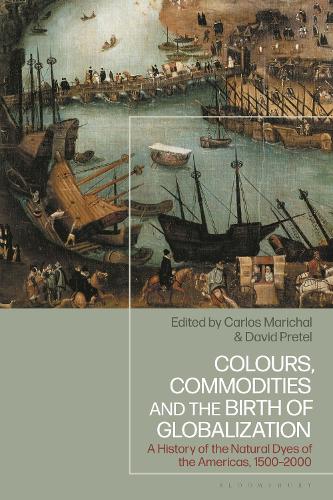
Colours, Commodities and the Birth of Globalization: A History of the Natural Dyes of the Americas, 1500-2000
(Hardback)
Publishing Details
Colours, Commodities and the Birth of Globalization: A History of the Natural Dyes of the Americas, 1500-2000
By (Author) Carlos Marichal
Edited by David Pretel
Bloomsbury Publishing PLC
Bloomsbury Academic
3rd October 2024
United Kingdom
Classifications
Professional and Scholarly
Non Fiction
General and world history
Economic history
Globalization
338.4766726097
Physical Properties
Hardback
256
Width 157mm, Height 234mm, Spine 20mm
530g
Description
This volume explores the global history of natural dyes from the Americas and asks how their production and trade have shaped globalisation since early modern times. From their extraction and processing to their overseas trade, it shows how this commodity contributed to the rise of the textile industry and consumption in Europe, the United States and Latin America. In doing so, it sheds new light on the emergence of a global economy. Spanning several centuries, Colours, Commodities and the Birth of Globalization takes the reader from 1500 through the industrial revolutions of Europe and the United States and culminates in the synthetic age of the late-19th and early-20th centuries. Ranging from the indigo trade in the Atlantic to the secrets of the Indian production of cochineal, the chapters in this collection transcend nationally bounded historical narratives and explore transoceanic dynamics, imperial ambitions and the cross-cultural exchange of knowledge and techniques to better understand the birth of globalization.
Author Bio
Carlos Marichal is Emeritus Professor of Economic History at El Colegio de Mxico, Mexico. He has published twenty books, as author and editor, including A Century of Debt Crises in Latin America, 1820-1930. In 2012 he received the National Prize of Mexico in Sciences and Arts. David Pretel is Assistant Professor at Autonomous University of Madrid, Spain. He has been visiting scholar at the universities of Harvard, Cambridge, UCLA, and the Max Planck Institute. His first book, Institutionalising Patents in Nineteenth-Century Spain, examined the development of the Spanish patent system, and he is co-editor of the volumes The Caribbean and the Atlantic World Economy, 1650-1914 and Technology and Globalisation: Networks of Experts in World History.
